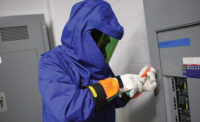NFPA 70E is one of the most important safety documents
Compliance benefits include improved safety culture and savings increases for employers.

Today more than ever, companies need to reduce employee injuries and incident rates and avoid the costs of downtime due to electrical equipment failures. Implementing comprehensive electrical safety programs that result in changing and improving a company’s safety culture can help make these goals a reality. The National Fire Protection Association Code 70E (NFPA 70E) Standard for Electrical Safety in the Workplace aims to keep workers safe and provides specific guidelines for:
- Strong electrical safety policies
- Robust lockout/tagout programs, including machine specifics/annual recertification
- Arc flash analysis
- Utilization of NFPA 70E field labels for all electrical equipment
- Personal Protection Equipment (PPE) availability and corresponding training
- Proper use of test equipment
- Knowledge of necessary documentation for job safety plans/briefs, energized electrical work permits, and comprehensive electrical safety training programs
Training matters
There are many instances when being properly trained may save your life. For example, a worker may experience a change in environmental conditions in a very short amount of time on the job. Your test equipment may be operating perfectly, but a change in location from extreme cold to extreme heat can cause condensation to build up, resulting in test equipment hazards.
Another highly dangerous situation, which occurred at a facility where roof repairs were being completed, resulted in a severe arc flash incident. Continuous rain over the course of two days created a leak that ran down an interior wall and into the back of one of the main electrical panels within the facility. The hidden leak caused an explosive arc flash to destroy the room. Thankfully, all employees who would have been working in the area were off duty and no injuries resulted.
Electrical hazards are numerous, and it is imperative that companies have educated employees with the most updated information out there. Training should be based on the level of risk to employee. The electrical employee who accesses and is exposed to energized equipment will require the highest amount of training.
Update your electrical safety policies
Employers need to understand company policies cannot be written in stone. As a company, safety policies must be re-visited and updated on a regular basis to assure the highest level of safety for all. Training must be updated for both new workers and those who need a refresher course.
Electrical safety training keys
If at the end of safety training, employees have learned key points that will benefit them and their co-workers such as being able to identify and avoid hazards, using precautionary techniques for working around hazards, and understanding how to select and properly use PPE, including arc flash, insulating, and shielding materials - then as a trainer, I’ve succeeded.
Looking for a reprint of this article?
From high-res PDFs to custom plaques, order your copy today!







